Trailblazer Profile: Dr. Greg McLeod
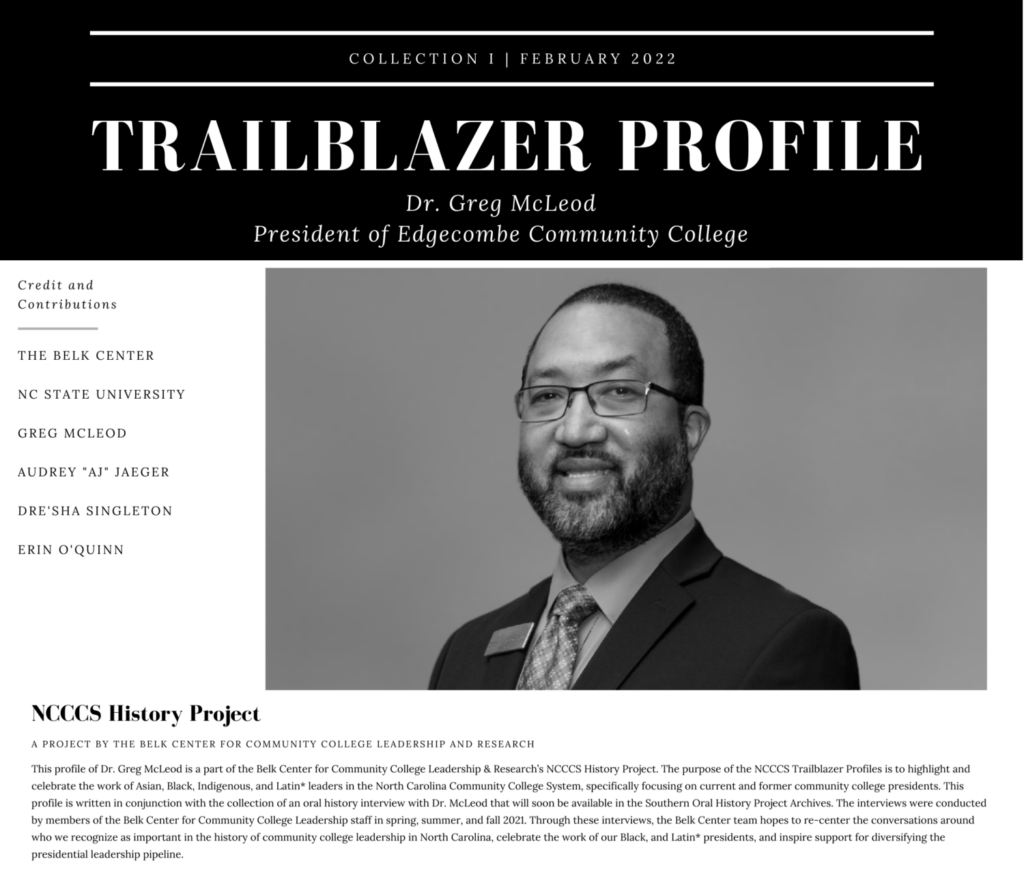
Dr. Greg McLeod
Growing up in Raeford, N.C., Dr. Greg McLeod didn’t know that he would end up with a career in the community college system. However, his upbringing in a family dedicated to community and leadership, it seemed that he was destined for a path to blaze trails and help others.
McLeod always had a passion for learning and he excelled in the classroom, but with limited opportunities in his own community, he didn’t know what he wanted to be or what he could be. “In Raeford, we didn’t have too many minorities in positions of leadership, government or business,” said McLeod. “I saw people in different professions, but if you don’t see people who look like you, you don’t know what you can truly be.” Though his opportunities were limited, McLeod always had the encouragement and support of his family – whom he credits for guiding his path in education.
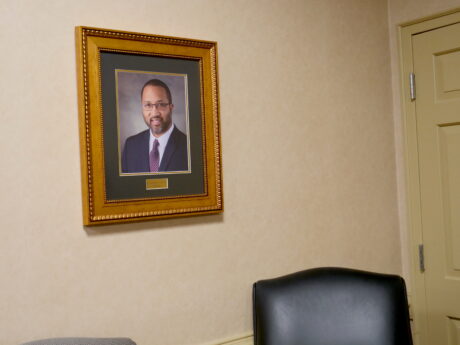
Throughout his childhood, McLeod had close relationships with his great-grandfather and grandfather – individuals he recognizes as some of the most influential in his life. “My great grandfather was a farmer who didn’t have more than a seventh-grade education, but he was just a wonderful human. He was all about community and helped anyone who needed it, and I think I got that sense of community from him,” said McLeod. “My grandfather was a leader – a beloved and respected preacher. He wasn’t authoritative – he was very fair, he was focused, he was serious. He had a lot of conviction about what he believed in and I believe that benefited me in what I do.”
McLeod’s father was equally impactful on his professional life path, instilling the value of a good education and sparking his interest in community college – even after his own college plans were disrupted when he was drafted for service during the Vietnam War. “When I was in elementary school, my father enrolled at Fayetteville Technical Community College. My earliest memory in my life of stepping foot on a college campus was going with him to Fayetteville Tech,” recalled McLeod. “I just remember the impression of being on a college campus and just looking around and saying, ‘Wow, look at this.’ I really didn’t know anything about college at that point, except through him, and that was a wonderful opportunity for me.”
Years later, McLeod attended the University of North Carolina at Chapel Hill as a North Carolina Teaching Fellow Scholar, where he earned a bachelor’s degree in math education in 1993. Upon graduating, he taught middle school and high school math before leaving education for a few years to travel nationally and abroad in a corporate marketing role. And while the corporate opportunity was an exceptional one, McLeod realized quickly that his true passion was teaching. He accepted an adjunct math professor position at Durham Technical Community College – a job he credits as the best opportunity of his life.
“At Durham Tech, I discovered the whole mission of the community college. I met people of all walks of life – people who looked like me and who didn’t look like me, people with different motivations, people at different age levels. I fell in love with it, and from there, I ended up getting a full-time position at the college.”
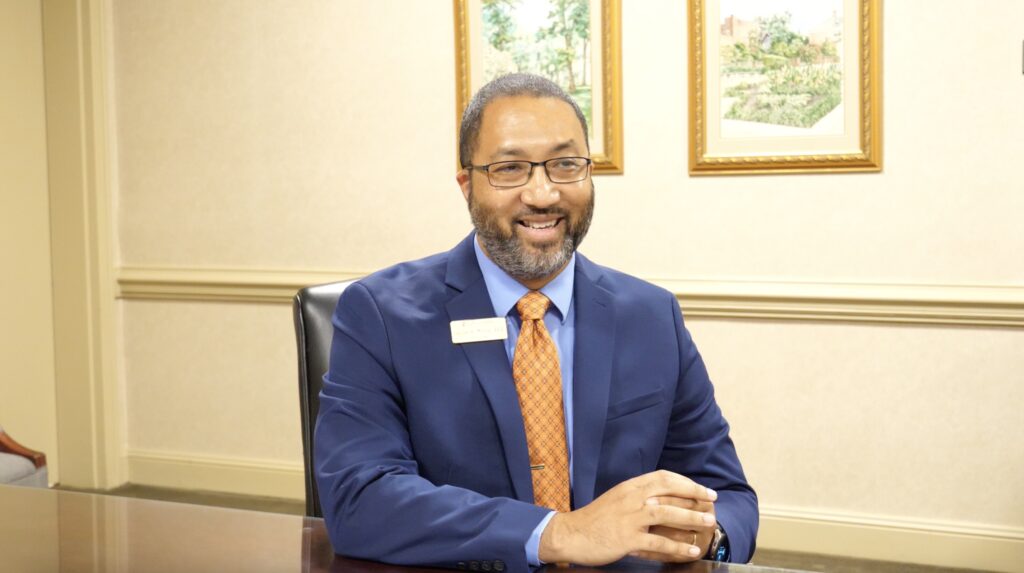
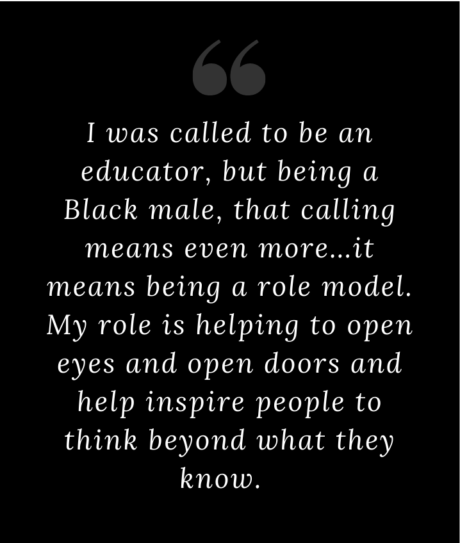
While teaching, McLeod earned his master’s degree in training and development with a certificate in business management from NC State University. It was during this time that he came to a crossroads in his life, wondering what it would be like to get onto the administrative side of the house at a community college. That curiosity led him to Florida and a grant program coordinator role at St. Petersburg College, a position that confirmed that he could still make a difference for people as an administrator. “I discovered that I could work with even more people at the college and effect positive change for young people by working on that side,” McLeod said. “And of course, still keeping some connection to the classroom by adjunct teaching on the side.”
Over the next several years, McLeod held a number of positions at St. Petersburg College while simultaneously earning his Ph.D. in leadership and education. In 2011, he accepted a role as provost and executive director at St. Johns River State College in St. Augustine, Fla., and a few years later, as provost and chief administrative officer at Thomas Nelson Community College in Williamsburg, Va.
In 2018, McLeod returned to his home state of North Carolina to take office as president of Edgecombe Community College (ECC). As the college’s first African American leader, President McLeod recognizes the significance his race plays in shaping the expectations and perspectives that people have for him. “People look at me and they see that I’m a minority male, that I’m a Black male, and that carries certain expectations and stereotypes. But I embrace that, quite honestly,” he said. “I was called to be an educator, but being a Black male, that calling means even more…it means being a role model. My role is helping to open eyes and open doors and help inspire people to think beyond what they know. So, I think that’s really huge. If I can be inspirational to others, I think that’s part of what I’m here to do.”
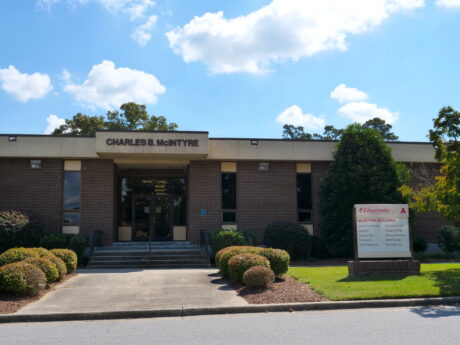
Appointing McLeod as the first Black president of ECC was an important step for the North Carolina Community College System (NCCCS), but in McLeod’s eyes, it’s only a stepping stone toward the path of racial equity and justice in the system. And while he doesn’t have all the answers for how that path will be completed, he does know that it starts with developing and recruiting a diverse group of faculty and staff. “Students need to see diverse representation of their community standing in the classroom in front of them. And whether or not they’re Black students or white students, they all need to see that. That makes a huge impression on their lives.”
In light of the national turmoil of recent years, McLeod knows that the responsibility of ensuring racial equity in the NCCCS is not just in the hands of the system leaders, it’s also a key responsibility of his and his counterparts at colleges across the state. “I feel a tremendous responsibility – especially in 2021 and after what we saw in 2020. I feel like there’s a divide built on stereotypes and prejudices and biases,” said McLeod. “And so, it is part of my duty to help break down those barriers by trying to be all that I can be, and be a positive light. Not just in front of people who look like me, but people who don’t look like me, because I think that helps to break down that stereotype.”
It’s that mindset that makes McLeod a trailblazer. Breaking down barriers, working every day to benefit others, always thinking about the big picture, and at the end of the day, leading others down a path that they didn’t know was there. “I’ve benefited to a large extent because of the people who paved the path before me – my great grandfather, my grandfather, my dad and many others. I feel like I’m standing on their shoulders and I feel that responsibility to help do the same for future generations. It’s humbling to be considered a trailblazer, but it’s a responsibility I take seriously and I’m grateful for being in this position.”
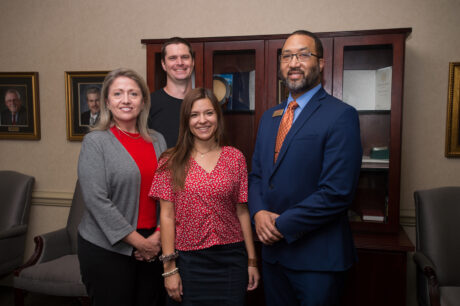
Impacting students and working to advance the community college system is fulfilling and rewarding in countless ways, but that doesn’t mean that there aren’t difficult days when tough decisions have to be made. But it’s in those times that McLeod is grateful for ECC’s dedicated faculty and staff who work tirelessly to support students on their educational journey.
“The challenges are not something that I was naive about coming into the role, but I’ve accepted and embraced them. And I’ll say the great thing about it is knowing that I’m not alone in what I’m here to do,” said McLeod. “I’ve always said that it takes a village to educate a student, so when there are tough decisions to make, it’s important to have the right people around the table. And while we all have our areas of expertise, we come together to move the college forward. We do the best that we can for our students and our community, and it’s just an awesome role to be in.”
Collection I | February 2022